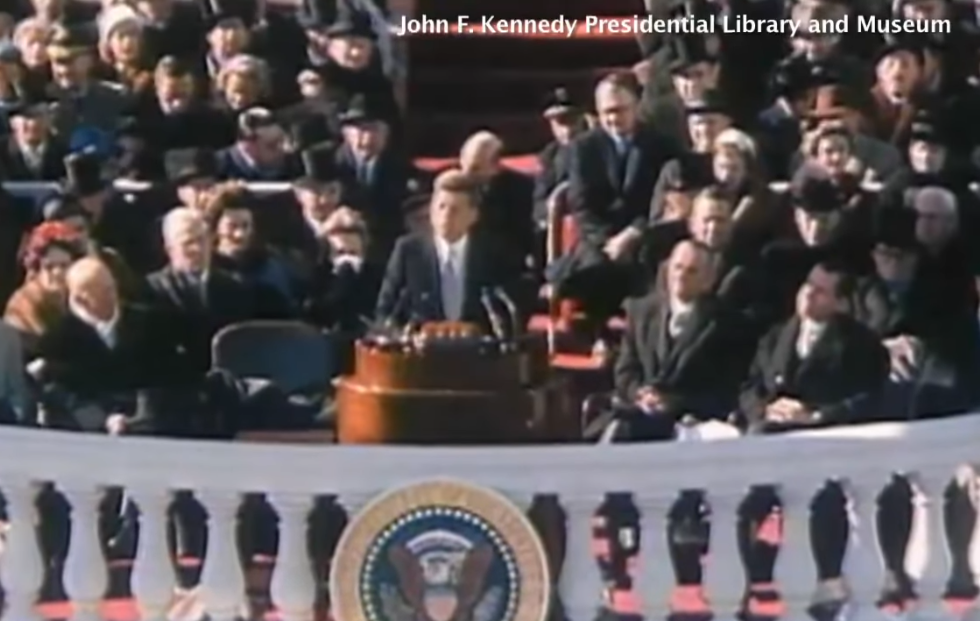FDR and JFK— Standards of Excellence for Biden’s Inaugural Address

L. Ian MacDonald
January 20, 2021
In measuring presidential inaugural addresses of the last century, there are two standards of excellence, Franklin D. Roosevelt in 1933 and John F. Kennedy in 1961. Roosevelt came to power during the Great Depression, the worst economic crisis in American history, which from the stock market crash of 1929 had doomed his predecessor, Herbert Hoover, to electoral oblivion in 1932.
“First of all,” Roosevelt famously began, “let me assert my firm belief that we have nothing to fear but fear itself.”
But then, a reminder of reality: “Only a foolish optimist can deny the darker realities of the moment.” Roosevelt, a polio survivor in a wheelchair, would win four elections and serve 12 years, building a new era of prosperity and leading the Allies to victory in the Second World War. He would become the longest serving president in American history, the only one ever to serve more than the traditional two term limit now prescribed by the 22nd amendment of the US constitution, adopted in 1951.
Kennedy came to office, as he said, representing “a new generation of Americans, born in this century, tempered by war, disciplined by a hard and bitter peace.” As he said: “We observe today not a victory of party but a celebration of freedom, signifying an end as well as a beginning, symbolizing renewal as well as change.”
And in a historic conclusion: “My fellow Americans, ask not what your country will do for you, but what you can do for our country. My fellow citizens of the world, ask not what America will do for you, but what together we can do for the freedom of man.”
Standing in that same place, the West front of the US Capitol, Joe Biden took a page Wednesday from both his illustrious predecessors in the Democratic party at a new time of testing in American history.
Echoing Roosevelt, Biden declared, “there is much to do in this winter of peril.”
And as JFK did, he also reached out to the world, pledging to “repair our alliances and engage with the world again.” To allies who have been disappointed in the US, and rivals such as Russia and China looking to fill a vacuum of leadership, he pledged that America would “lead not merely by the example of our power but by the power of our example.”
Normally, hundreds of thousands of celebrants would have gathered on the National Mall to hear the new president’s speech following his swearing-in, but it was practically deserted in the wake of the armed insurrection and attempted takeover of the Capitol led only two weeks earlier by his discredited predecessor. As Biden noted: “Here we stand, just days after a riotous mob thought they could use violence to silence the will of the people, to stop the work of democracy.”
There was also the matter of honouring the 400,000 Americans who have died in the pandemic. “It has taken as many lives in one year,” Biden pointed out “as America lost in all of World War II.” Recovering and healing from the pandemic, and its economic consequences, were Biden’s clearly enunciated priorities, with honourable mention of climate change and “a cry for survival that comes from the planet itself.”
His predecessor’s absence from the scene did not pass unremarked, though most everyone was grateful he had taken his leave earlier in the day from Joint Base Andrews on his way home to Palm Beach. Typically, neither he nor his guests bothered to wear masks to a farewell at his final departure as president aboard Air Force One. And in a characteristically cheap gesture, Trump had not even offered a government aircraft to bring Biden and his family to Washington Tuesday, and he was left to charter his own plane from his home in Wilmington, Delaware.
Hoover, defeated for a second term, nevertheless rode with Roosevelt in a convertible on their way to the Capitol. In Kennedy’s case, the defeated Republican nominee and vice president, Richard Nixon, sat beside his successor, Lyndon Johnson, at JFK’s inaugural.
Imagine, Nixon having more class than Donald Trump. But then, Nixon had the presence of mind to resign over Watergate before he could be impeached even once, let alone twice. And his replacement, Gerald Ford, sat with Jimmy Carter who at his inauguration in 1977 thanked him for all he had done “to heal our land.”
In Biden’s case, he spoke of addressing systemic racial injustice and other societal issues including gender equity.
But he received sustained applause just for the mention of Kamala Harris as “the first woman in American history elected to national office.”
They were together the previous evening at the Lincoln Memorial for a sunset ceremony in honour of pandemic victims. Harris introduced Yolanda Adams to sing “Hallelujah”—a signature song of Leonard Cohen.
This was the Canadian moment of the inauguration, or rather the Westmount High moment—Harris spent her formative years there in Montreal before graduating in the class of 1981. Cohen was president of the class of 1951.
O, Canada.
L. Ian MacDonald, Editor and Publisher of Policy Magazine, was principal speechwriter to Prime Minister Brian Mulroney and later head of the public affairs division of the Canadian Embassy in Washington in the early 1990s.
